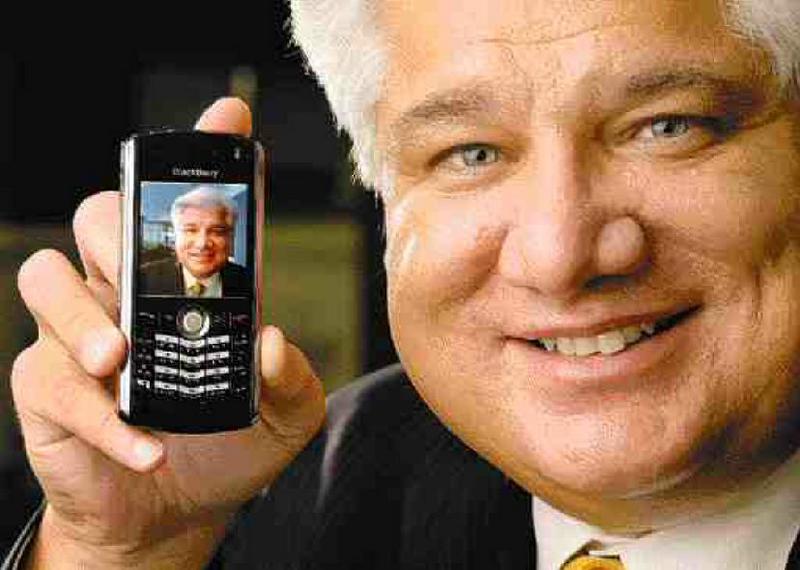Q&A: RIM co-founder Mike Lazaridis
IT PRO spoke to one of the founders of RIM about the success of BlackBerry, the next level of integration with enterprise systems, rivalry and co-operation with Microsoft - and the truth about the recent outage.


When he was 12, Mike Lazaridis won a prize from the local library for reading every science book on the shelves. He dropped out of university before he finished his engineering degree to co-found RIM but he's stayed an engineer at heart; he's donated millions of (Canadian) dollars to found institutes in theoretical physics and quantum computing and he hates the idea of letting marketing dumb down innovation to make products simple. We caught up with him at RIM's annual Wireless Enterprise Symposium to ask if the system failure had damaged RIM's reputation and what the next big thing after mobile email will be.
What can you say about the BlackBerry system failing in North America in April?
It happened. First of all, we hadn't had an outage in two years, and it was going through hypergrowth, so it wasn't like the system had any issue from growth or scale. There was no outside influence that caused it.
Our first priority was to get people up, and once we had people up and running we had to make sure the system was healthy so it wouldn't happen again - because once you open the floodgates and let everybody reconnect there's a lot of email to suddenly deal with. Remember, we didn't lose any data. The next thing was to work with the carriers so their networks didn't get flooded by the build-up of connections. Once we got there, we went to try and figure out the root cause. We'd kept a continuous log of what was going on, so we could do a post mortem later. When we figured out what root cause was we posted it.
It was maintenance that was done on the cache system for the file servers for the database, to improve the efficiency of the cache, and it should not have been done on both at the same time.
Did you make any changes to internal procedures as a result of the outage?
Well yes. The biggest of them being "Don't optimise both the system and the backup at the same time." I should say, we don't normally do that. We ran our tests, it looked innocuous. All the tests we ran and the vendor ran made it look very routine. It turns out that there is a rare occurrence and under the kind of load we run our systems at that it can rear its ugly head.
Sign up today and you will receive a free copy of our Future Focus 2025 report - the leading guidance on AI, cybersecurity and other IT challenges as per 700+ senior executives
Unfortunately, we were all confused over what root cause was so we were going down the wrong way to recover the system. No one was expecting that this was the issue. It wasn't a hardware failure, it wasn't a software failure. It was an intentional interaction of the cache based on the maintenance.
How negative were the reactions you saw from customers and potential customers? Do they have concerns about reliability? Or did the outage show them how much their business relies on email?
I don't want to put this too lightly. We were down. We went down at night. We were up and running before the morning load increase that we expect but we had a backlog that had to filter through that took many hours. The whole of North America went down and the systems are designed to bring back customers at a rate that doesn't cause excess load on the network. However, one of the things people learned, they looked back and said "when was the last one?" and we said "well it was two years ago". Then they started realising that is almost five nines - that's telecoms grade. It is just that people have become so dependent on their BlackBerry; it's become so mission critical - it's become a way of life.A BlackBerry isn't the only device that can do push email now, or mobile applications. You're talking about connecting to the PABX as the next step for enterprise mobility; how does that fit in?
There are four data stores that exist in most companies. The first was the desktop. Synchronising email and PIM was a major, major challenge - doing it right, doing it securely, doing it efficiently, doing it reliably and making it cost effective had been a major challenge. That technology has been embraced by millions of people, by tens of thousands of organisations; that technology now embraces all the major email and system platforms. What's interesting is that we can extend the advantage of that always-on push connection, we can take what we've learned and extend connectivity to the other data stores.
We talk about real-time computing and we've talked about corporate grade instant messaging. We know how successful instant messaging has been in the consumer space and what's really amazing is to see the power of instant messaging in the corporate space. It gets even more exciting as we start looking at the other two data stores. One of those is the back-end data stores - this is where all the critical information is that is the lifeblood of corporations, the information that makes the enterprise flow, operate and be successful. Things like SAP, Oracle, Siebel, IBM WebSphere, .NET, Java, web services and securely browsing the corporate intranet - these are all basic capabilities you can take advantage of by using the mobile data services and we have a lot of partners taking advantage of the connectivity that is inherent in the BlackBerry.
Is the company phone system is the next data store to use a BlackBerry with?
It always seemed natural to me - it's a phone! I can transfer calls, I can accept calls and make conference calls on the wireless network already and quite frankly I don't use my desk phone for doing much more than that. Really, what I've always looked forward to was some way of getting my contacts off my device and into the desk phone. Clearly that wasn't going to happen in my lifetime so we decided we were going to work with the PBX heritage that's there and try and make the BlackBerry the remote control it's been with the desktop.
I think it's only natural as the industry goes to IP based PBXs and SIP interfaces this should become more and more common. It's just taken longer and been far more complicated than it looks. We discovered we needed a way to cross over the gap because there is so much TDM out there and that's where the Ascendant purchase comes in. That allows us to bridge the gap so we can work with TDM based PBXs, We can work with new SIP based PBXs - but in most cases we need to work with both. There's such an installed based and they work just fine but interfacing to them is the work of experience, and trial and error.
What do enterprises want to do with a BlackBerry connected to a PABX? Are they looking for unified messaging, cost savings or giving users a simpler interface to phone features?
This might surprise you but they love two things. One that it is authenticated. It is built on top of the BlackBerry security model so it's as inherently secure as their PABX but you're outside the corporation. That is important, so that when you place a call the caller ID is correct, it can't be spoofed. It forces calls to be done certain ways - so compliance issues can be dealt with in ways that are already implemented in the corporation.
The second thing is you can program it so it rings all the locations you are normally at, at the same time. Not in sequence; a lot of solutions are just call forwarding and you sit and wait and wait. If you're in your office both ring simultaneously - your desk phone and your BlackBerry - and whichever you pick up the other stops ringing. Which to me is natural - you have two phones, you pick one up, it stops.
Are there still new features that you can add to the BlackBerry Enterprise Server for what businesses are already doing with their devices?
We are adding all kinds of monitoring technology. We're adding APIs so you can integrate with your existing network and system monitoring and health and provisioning systems. We are adding probably one of the most important features we've ever done, and it's probably the most desired, single largest TCO reduction - over the air software loading and over the air software maintenance of these devices. What we're very close to providing is being able to upgrade and maintain that device up-to-the-minute using the wireless environment, remotely. You'd never have to bring anything back.Microsoft and Adobe are working on bringing platforms like Apollo and Flash and .NET to mobile phones. Do you think rich Internet applications are going to be important on mobile devices the way they are on the desktop?
It's too early to tell. The world is just discovering the power and value of having email access, instant messaging access and web browsing in a phone. Historically it hasn't been a one to one correlation between what works on a bigger screen - a big laptop, with a graphics controller, tons of memory, plugged into the wall plus you're comfortably seated at a chair versus walking down the street with something in one hand and your BlackBerry in the other frantically trying to reply to a message about "where are you". I don't think it's a one to one correlation between what works on the web and what works on a handheld device. That being said, access to those things does work, the occasional need to access web sites is valuable. Whether it will be exactly the same features that are successful on a handset versus what's on the web remains to be seen.Are you worried by the release of Windows Mobile 6?
We've actually embraced it. We're supporting it with virtual BlackBerry. When you run it, it looks just like a BlackBerry and the BlackBerry applications run on it, not just from us but also from third parties. In the long term, I don't think it really matters at some point. The thing that people forget is we support Microsoft in two of their most profitable businesses. We support their Exchange business and their SQL business. We were the first company to stop using MAPI as a database and go straight to SQL because our deployments were getting so large and we were taxing MAPI enormously; so we decided to use a proper database and we decided to use Microsoft's database, just as we use DB2 for Lotus Notes.
We may compete in some ways with Windows Mobile but on the other hand, we support Windows Mobile, we always have, with BlackBerry Connect. The market is so big you can continue like this.
You've got eight million BlackBerry users now. Where will the next eight million come from - consumers, new markets or more users in existing customers?
All of the above! What happens when we put out a new model is certain people get to trade up and others get the current model; these products have a long lifetime in the organisation. It becomes more economic to bring in new products because you're able to continue to use older assets so you get much longer amortisation from them. That's one of the reason why BlackBerry Is truly cost effective; there's a lot of noise about its cost but the fact is the products last a long time.Do you still see a lot of BlackBerry users carrying a mobile phone as well, or is it becoming more accepted as a phone too?
That's changing quickly. The crossover products, the Pearls and Curves are changing that. Think of the way it looks if you pull out your BlackBerry pearl and do some email and then you pull out a bigger phone to make a call - it looks a little odd, doesn't it. There's personal phones versus business BlackBerry's; that's going to continue until the carriers come up with two numbers, dual lines on SIMs, split billing and so on.BlackBerry users do write longer emails and take more care about spelling and punctuation, don't they...
That's because they don't want the boss to know it's coming from the BlackBerry - on a beach somewhere!
Mary is a freelance business technology journalist who has written for the likes of ITPro, CIO, ZDNet, TechRepublic, The New Stack, The Register, and many other online titles, as well as national publications like the Guardian and Financial Times. She has also held editor positions at AOL’s online technology channel, PC Plus, IT Expert, and Program Now. In her career spanning more than three decades, the Oxford University-educated journalist has seen and covered the development of the technology industry through many of its most significant stages.
Mary has experience in almost all areas of technology but specialises in all things Microsoft and has written two books on Windows 8. She also has extensive expertise in consumer hardware and cloud services - mobile phones to mainframes. Aside from reporting on the latest technology news and trends, and developing whitepapers for a range of industry clients, Mary also writes short technology mysteries and publishes them through Amazon.
-
 Gender diversity improvements could be the key to tackling the UK's AI skills shortage
Gender diversity improvements could be the key to tackling the UK's AI skills shortageNews Encouraging more women to pursue tech careers could plug huge gaps in the AI workforce
-
 Researchers claim Salt Typhoon masterminds learned their trade at Cisco Network Academy
Researchers claim Salt Typhoon masterminds learned their trade at Cisco Network AcademyNews The Salt Typhoon hacker group has targeted telecoms operators and US National Guard networks in recent years
